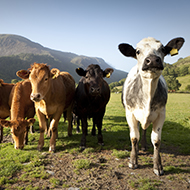
BVA president Dr Justine Shotton addresses guests at the association's Annual Welsh Dinner.
The Welsh veterinary workforce needs immediate multi-stakeholder action to increase recruitment, retention, and rates of return, according to Justine Shotton, president of the British Veterinary Association (BVA).
Speaking at BVA's Annual Welsh Dinner in Cardiff on Tuesday, Dr Shotton stated that in the face of Covid, Brexit, and a recent rise in pet ownership, Welsh vets have worked exceptionally hard to maintain animal health, safeguard public health, and keep the food chain flowing.
She did, however, warn that it had been a really difficult period, adding: “We also need to acknowledge that this has come at a significant – and ultimately unsustainable – cost to the profession’s capacity and wellbeing.
"If we are going to cope with ongoing and new or unforeseen challenges ahead, we need action now to improve recruitment, retention and rates of return to veterinary work, to ensure that all existing vets can feel supported, safe and rewarded in their careers, and to encourage future vets from all walks of life to follow in our footsteps," she said.
Addressing around 75 guests, including the UK's chief veterinary officer Christianne Glossop, animal welfare charities and stakeholders, Dr Shotton called on Welsh and UK governments, animal owners, the profession itself and future vets to take a range of actions to help create a “flexible, resilient and future-proofed workforce”.
These included anything from ensuring that future veterinary schools, like the one opening in Aberystwyth, had enough funding and resources to reminding pet owners to "Respect Your Vet". Dr Shotton emphasised to would-be vets that a fulfilling veterinary career can be attained in various ways.
Reflecting on recent months, Dr Shotton said that the profession’s “resilience and dedication” had shone through in how vets had responded to and mitigated recent disease outbreaks in Wales and across the UK, including the Avian Influenza outbreak.
She also recognised that BVA welcomed the general direction of travel of the Welsh Government’s refreshed Bovine TB eradication programme, saying:
"Steps towards more informed biosecurity considerations when purchasing cattle, changes to the testing regime, increased information sharing and improvements to the compensation regime all help to strengthen our lines of defence against this devastating disease. Moving forward, it’s imperative that those at the frontline of these efforts – particularly farmers and private vets – feel empowered to take bold steps forward on TB control, with good trust and lines of communication between themselves and government.”
On pet welfare, Dr Shotton warned that the surge in pet ownership during the pandemic had tested the veterinary capacity and also presented problems with “some new owners placing looks over health in the breeds that they choose, and unscrupulous breeders prioritising profit over welfare.”
The BVA President ended her speech with a tribute and presentation of BVA life membership to Welsh Chief Veterinary Officer Christianne Glossop, who will be stepping down in September after 17 years in the role.



 The RCVS has announced a new version of its 1CPD mobile app, with enhanced features for veterinary surgeons and veterinary nurses to record their continuing professional development.
The RCVS has announced a new version of its 1CPD mobile app, with enhanced features for veterinary surgeons and veterinary nurses to record their continuing professional development.